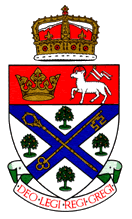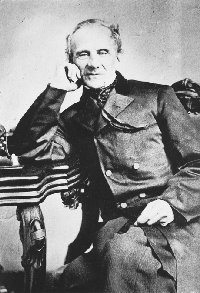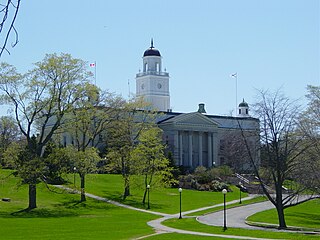Daniel Cobb Harvey (January 10, 1886-August 7, 1966), FRSC was a Canadian historian and archivist.
Daniel Cobb Harvey (January 10, 1886-August 7, 1966), FRSC was a Canadian historian and archivist.
Harvey was born in Cape Traverse, Prince Edward Island. He attended Prince of Wales College and then Dalhousie University where he graduated in 1910. He achieved a Rhodes scholar upon graduation and then attended Oxford University where he obtained a B.A. and an M.A. From 1915 to 1931 he taught at Wesley College and then at the University of Manitoba. [1] In 1931 he became Provincial Archivist for Nova Scotia, a newly created position and stayed in the capacity until his retirement in 1956. [2]
He was President of the Canadian Historical Association from 1937 to 1938. He was elected a fellow of the Royal Society of Canada in 1928 and he received its J. B. Tyrrell Historical Medal in 1942. [3]

Andrew Randall Cobb, ARCA, FRIBA was a Canadian-American architect based in Nova Scotia.

The University of King's College is a public liberal arts university in Halifax, Nova Scotia. Established in 1789, it is the oldest chartered university in Canada, and the oldest English-speaking university in the Commonwealth outside the United Kingdom. The university is regarded for its Foundation Year Program (FYP), an undergraduate curriculum designed to comprehensively study a variety of intellectual developments—past and present—through great books and ideas. It is also known for its upper-year interdisciplinary programs, particularly in contemporary studies, early modern studies, and the history of science and technology. In addition, the university has a journalism school that attracts students from across the world for its intensive graduate programs in journalism, writing, and publishing.

Joseph Howe was a Nova Scotian journalist, politician, public servant, and poet. Howe is often ranked as one of Nova Scotia's most admired politicians and his considerable skills as a journalist and writer have made him a provincial legend.

Events from the year 1849 in Canada.

Sir Joseph Andrew Chisholm was Mayor of Halifax and Chief Justice of the Supreme Court of Nova Scotia.

Province House in Halifax is where the Nova Scotia legislative assembly, known officially as the Nova Scotia House of Assembly, has met every year since 1819, making it the longest serving legislative building in Canada. The building is Canada's oldest house of government. Standing three storeys tall, the structure is considered one of the finest examples of Palladian architecture in North America.

John Clarence Webster was a Canadian physician, surgeon, and pioneer in Obstetrics and gynaecology, topics upon which he wrote several textbooks. After his retirement in 1920 he became a historian, specializing in the history of his native New Brunswick, and a supporter of efforts to preserve heritage and historic sites.

St. Paul's Church is a historically evangelical Anglican church in downtown Halifax, Nova Scotia, within the Diocese of Nova Scotia and Prince Edward Island of the Anglican Church of Canada. It is located at the south end of the Grand Parade, an open square in downtown Halifax with Halifax City Hall at the northern end.

The Old Burying Ground is a historic cemetery in Halifax, Nova Scotia, Canada. It is located at the intersection of Barrington Street and Spring Garden Road in Downtown Halifax.

The history of Nova Scotia covers a period from thousands of years ago to the present day. Prior to European colonization, the lands encompassing present-day Nova Scotia were inhabited by the Mi'kmaq people. During the first 150 years of European settlement, the region was claimed by France and a colony formed, primarily made up of Catholic Acadians and Mi'kmaq. This time period involved six wars in which the Mi'kmaq along with the French and some Acadians resisted British control of the region: the French and Indian Wars, Father Rale's War and Father Le Loutre's War. During Father Le Loutre's War, the capital was moved from Annapolis Royal, Nova Scotia, to the newly established Halifax, Nova Scotia (1749). The warfare ended with the Burying the Hatchet ceremony (1761). After the colonial wars, New England Planters and Foreign Protestants immigrated to Nova Scotia. After the American Revolution, Loyalists immigrated to the colony. During the nineteenth century, Nova Scotia became self-governing in 1848 and joined the Canadian Confederation in 1867.
Phyllis Ruth Blakeley, was a Canadian historian, biographer and archivist.

Nova Scotia Archives is a governmental archival institution serving the Canadian province of Nova Scotia. The archives acquires, preserves and makes available the province's documentary heritage – recorded information of provincial significance created or accumulated by government and the private sector over the last 300 years.

Noel is an unincorporated community in the Canadian province of Nova Scotia, located in East Hants Municipality in Hants County. The community is named after its most prominent resident Noël Doiron and was known for shipbuilding in the nineteenth century. Noel Doiron is the namesake of the village as well as the surrounding communities of Noel Shore, East Noel, Noel Road, and North Noal Road. The earliest recorded reference to the community of "Noel" was by surveyor Charles Morris in 1752. Prior to that date, the area is referred to as "Trejeptick", which first appears in the Colonial Office minutes of Annapolis Royal in 1734. Noel was also the home of the Osmond O'Brien Shipyard.

Leslie Raymond Fairn was a Canadian architect whose career is notable for its longevity and for the range of styles it encompassed, including Beaux Arts and Modernism. Most of his work was completed in the Maritimes.
Nova Scotia Agricultural College (NSAC) was a publicly owned Canadian university college located at Bible Hill, Nova Scotia. The Nova Scotia Agricultural College merged with Dalhousie University and became Dalhousie's Faculty of Agriculture on 1 September 2012. The popular nickname remains the "AC".

New Ireland was a Crown colony of the Kingdom of Great Britain twice established in modern-day Maine after British forces captured the area during the American Revolutionary War and again during the War of 1812. The colony lasted four years during the Revolution, and eight months during the War of 1812. At the end of each war the British ceded the land to the United States under the terms of the Treaty of Paris and the Treaty of Ghent, respectively.

Dr. Thomas McCulloch was a Scottish-born, Presbyterian minister, author, educator, and education reformer. He was the founder and principal of Pictou Academy and the first principal of Dalhousie College from 1838-1843. He is the author of The Stepsure Letters (1821-1823), considered to be the first major work of English Canada humour.

Cambridge Military Library is a library building in Royal Artillery Park in Halifax, Nova Scotia, Canada which was built in 1886. The building was created to house the garrison library collection, which had been moved from various locations in the city since its creation in 1817. It is the oldest non-university public library collection in Canada. This building was the social and literary centre of military Halifax. In 1902, the officers of the garrison requested the library be named after the Prince George, Duke of Cambridge.
Nova Scotia Magazine and Comprehensive Review of Literature, Politics, and News was Canada's first English-language magazine. It was published in Halifax, Nova Scotia from July 1789 to March 1792 by John Howe. It contained many articles from American, British and Irish publications, as well as local news. It was initially an eighty-page monthly periodical with over 200 subscribers, but despite reductions in price and size it was not profitable. In its first year it was edited by William Cochran, headmaster of the Halifax Grammar School, but who resigned following his appointment as president of King's College, Windsor and Howe took over as editor in July 1790.